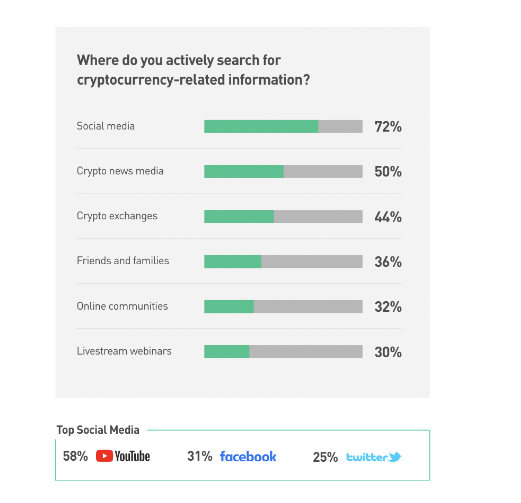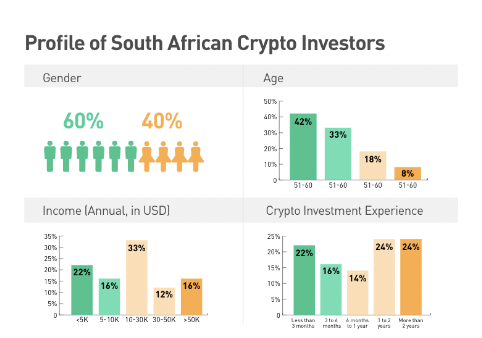About 22% of South Africa’s adult population, or 7.6 million people, are cryptocurrency investors, findings by a study done by Kucoin cryptocurrency exchange have shown. According to the study, 72% of the respondents said they get information concerning particular crypto projects via social media. Influencers and media personalities were also found to be key opinion leaders that are promoting cryptocurrencies.
Influencers and Media Personalities Found to Be Key Opinion Leaders
According to the findings of a new Kucoin study, about 22% of South Africa’s adult population aged between 18 and 60 (or about 7.6 million people) are cryptocurrency investors. The study also found that 65% of crypto investors “consider crypto to be the future of finance.” The report added that a large percentage of the users appear to prefer digital assets as their favored means of savings to earn stable returns.
Explaining how South Africans are sourcing information concerning crypto projects that they choose to invest in, the study findings reveal that nearly three-quarters (72%) of respondents are getting this information via social media. Besides social media, influencers and media personalities were found to be the main opinion leaders in the crypto promotion space.

Commenting on South Africans’ apparent preference for social media platforms as their first-choice information source, Kucoin CEO Johnny Lyu told Bitcoin.com News:
The data revealed by Statists shows that 30 million South Africans are social network users, and this figure is projected to grow to 40 million users by 2026. The country is seeing a rapid growth of influencers, TikTok bloggers and creators for whom social media have proven to be an easy and accessible source of income. The examples of well-known bloggers of African descent such as Khaby Lame are encouraging many Africans to spend more and more time on social networks in search of work, earnings and dating.
Lyu also noted that social media has become the quickest way for users to obtain information. He said this is particularly true now when “users’ time is now fragmented, and obtaining information quickly and effectively has become a mainstream way of life.”
South Africa’s Unequal Wealth Distribution
Meanwhile, in demographic terms, the cryptocurrency exchange’s study found that South African crypto investors are predominantly “male and younger generations.” Men are estimated to account for 60% of crypto investors while some 42% of the investors are thought to be aged 18 to 30. The study meanwhile exposes South Africa’s unequal wealth distribution and how low-income earners appear to use crypto as a tool for redressing the situation.
“The unequal distribution of wealth in the country is well illustrated by the findings of the report, as 22% of crypto investors earn less than $5,000 a year, while 16% earn more than $50,000 during the same period,” the study report explained.

While the study’s findings do suggest that interest in cryptocurrency is growing, the constant reports of South African crypto investors losing funds to scammers have nonetheless attracted the attention of regulators who have responded by either cracking down on crypto entities or warning the public against investing in cryptocurrencies.
However, despite the response from regulators, the study still found that South African crypto investors are “maintaining a positive attitude” towards cryptocurrencies as these are proving to be “capable of improving people’s standing financially.” Such adoption of cryptocurrencies is having the right impact on the local crypto market in general and this, in turn, helps to remove fraudulent individuals and players, the report said.
What are your thoughts on this study’s findings? Let us know in the comments section below.
![]()
Terence Zimwara
Image Credits: Shutterstock, Pixabay, Wiki Commons
Disclaimer: This article is for informational purposes only. It is not a direct offer or solicitation of an offer to buy or sell, or a recommendation or endorsement of any products, services, or companies. Bitcoin.com does not provide investment, tax, legal, or accounting advice. Neither the company nor the author is responsible, directly or indirectly, for any damage or loss caused or alleged to be caused by or in connection with the use of or reliance on any content, goods or services mentioned in this article.


